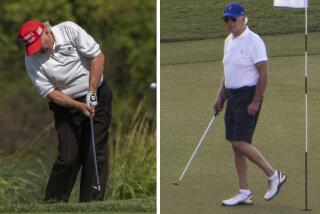Testimony: Disabled Rules Apply to Recreational Golf
- Share via
EUGENE, Ore. — Top golf officials testified in the Casey Martin case Tuesday that rules on the books making exceptions for disabled players were never meant to be used on the pro tour.
Judy Bell, immediate past president of the U.S. Golf Assn.,and PGA Tour Commissioner Tim Finchem were the final witnesses called to refute Martin’s argument that the Americans With Disabilities Act requires the tour accommodate his physical limitations and let him ride a cart.
Martin suffers from a rare circulatory disorder in his right leg that makes it painful for him to walk. His doctors warn he easily could break the weakened leg, which might require amputation.
Lawyers are expected to make their final arguments today before U.S. Magistrate Thomas Coffin, who could rule immediately on a case that has ignited a national debate on the rights of the disabled to play pro sports.
As did top golfers last week, Bell testified that walking is a fundamental part of the game, and allowing Martin to ride a cart would give him an unfair advantage.
But under cross-examination from Martin attorney William Wiswall, Bell acknowledged the USGA adopted additional rules last year to allow disabled golfers to compete against able-bodied players. For example, if a player in a wheelchair hits a ball into a sand trap, that player is allowed to drop a ball rather then venture into the trap.
Reading from the preamble to the rules, Wiswall noted that there is no mention that they should not apply to any golf competition, but Bell disagreed. “I would have to say they apply to recreational golf,” she said, explaining that at the pro level there is a premise that everybody is playing under the same rules.
Finchem testified that making an exception for Martin would give him an edge in a game where little things mean a lot.
He noted that the top 100 players on the PGA Tour on average all play within two strokes of one another for every 18 holes, yet Tiger Woods at the top won $2 million last year, and the 100th-place finisher won only $250,000.
Billy Andrade was $5 short of making 30th place on the money list last year, and as a result did not qualify for the U.S. Open and other top tournaments, Finchem said.
“Often times, one stroke in the course of a year can make a difference,” Finchem said. “If you provide access to one player or some subset of players, you are changing the level playing field.”
Finchem said he could not imagine a way to allow Martin to ride a cart without taking away from the fairness of competition.
“If I knew of a way, I would have advanced it,” he said. “I don’t.”
Granted temporary permission to ride a cart pending the outcome of this trial, the 25-year-old Martin gained widespread public support when he won the first tournament of the Nike Tour last month.
More to Read
Go beyond the scoreboard
Get the latest on L.A.'s teams in the daily Sports Report newsletter.
You may occasionally receive promotional content from the Los Angeles Times.










